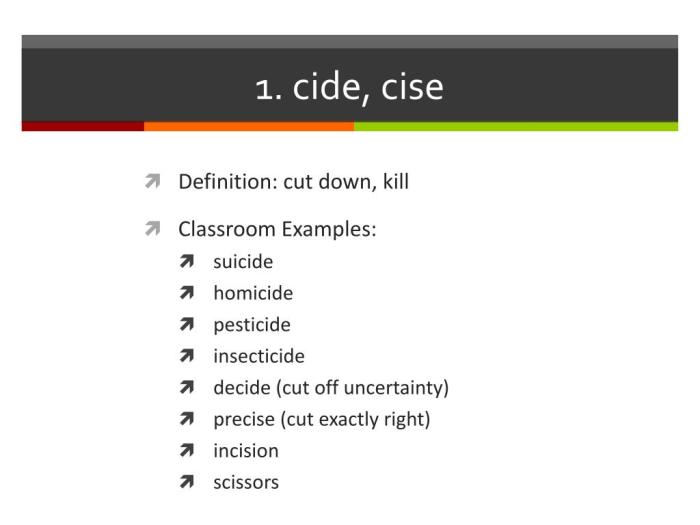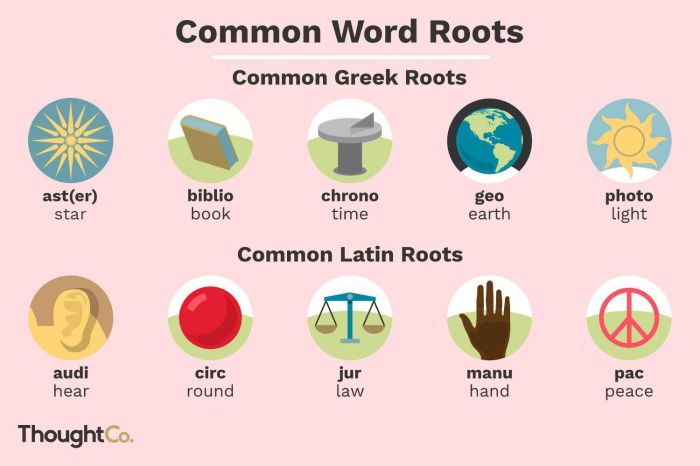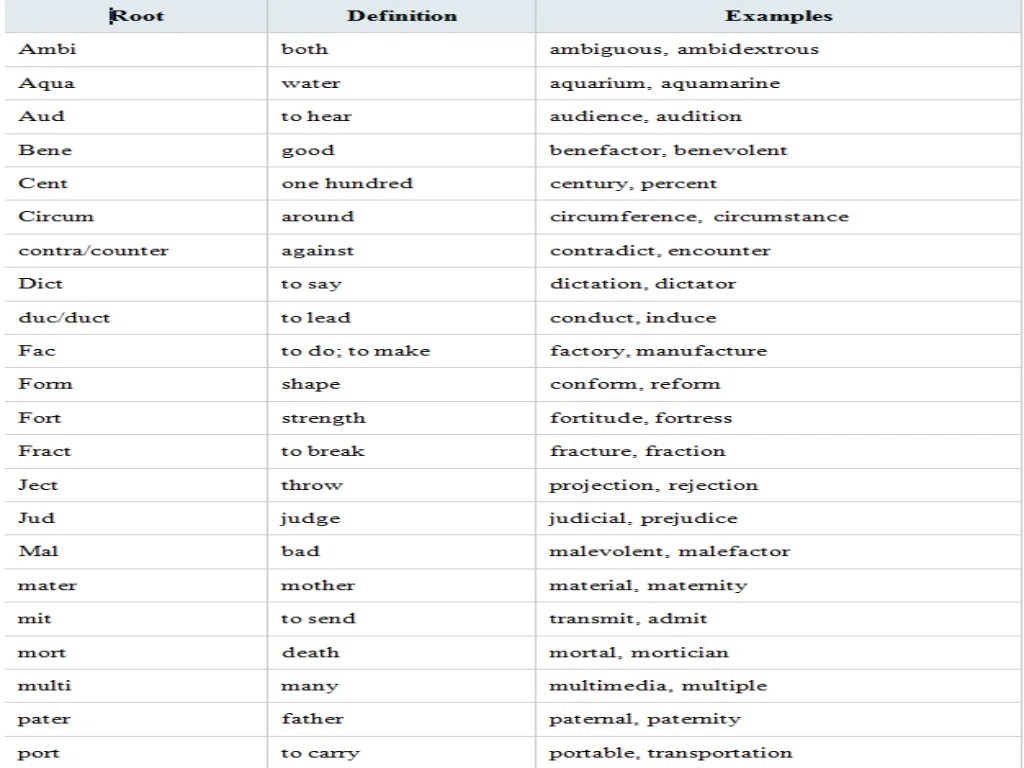Embark on a linguistic journey into the realm of words with the root word cise. These words, derived from the Latin root meaning “to cut” or “to divide,” have permeated our language, shaping its vocabulary and enriching its expressive power.
From precise incisions to subtle distinctions, words with the root cise convey a wide range of meanings and applications. This exploration will delve into their etymology, variations, and usage, unraveling the nuances that make them indispensable tools for communication.
Explain the etymology of the root word ‘cise’

The root word ‘cise’ originates from the Latin word ‘caedere’, meaning ‘to cut’ or ‘to kill’. It has been used in English since the 14th century, and has given rise to a number of words related to cutting or dividing, such as ‘incise’, ‘excise’, and ‘precision’.
Origin of the root word ‘cise’
The root word ‘cise’ comes from the Latin word ‘caedere’, which means ‘to cut’ or ‘to kill’. This word is thought to be derived from the Proto-Indo-European rootked-, which also means ‘to cut’. This root is found in a number of other Indo-European languages, including Greek, Sanskrit, and Old Irish.
Meaning of the root word ‘cise’
The root word ‘cise’ means ‘to cut’ or ‘to divide’. This meaning is reflected in the many words that have been derived from it, such as ‘incise’, ‘excise’, and ‘precision’.
Words with the root word cise, such as concise and incisive, often convey precision and clarity. Even the Great Gatsby comic strip employed concise language to capture the novel’s essence. Despite its visual medium, the comic strip effectively conveyed the story’s themes and characters using precise and impactful language, much like words with the root word cise.
Historical evolution of the root word ‘cise’, Words with the root word cise
The root word ‘cise’ has undergone a number of changes in meaning and usage over time. In the 14th century, it was used to refer to the act of cutting or dividing. However, by the 16th century, it had come to be used more specifically to refer to the act of cutting or dividing with a sharp instrument.
This meaning is still reflected in the modern use of the word ‘cise’.
Elaborate on words derived from the root word ‘cise’: Words With The Root Word Cise

The root word ‘cise’ originates from the Latin word ‘caedere’, meaning “to cut”. This root word has given rise to numerous English words that share the concept of cutting, dividing, or separating.
Words Derived from the Root Word ‘Cise’
The following table lists some words derived from the root word ‘cise’, along with their part of speech and a brief definition:
| Word | Part of Speech | Definition |
|---|---|---|
| Circumcise | Verb | To cut around or remove a part of the skin, especially around the genitals |
| Concise | Adjective | Brief and to the point |
| Decision | Noun | A choice made between two or more options |
| Excise | Verb | To cut out or remove a part of something |
| Incise | Verb | To cut into something |
| Precision | Noun | The quality of being exact or accurate |
| Scissors | Noun | A cutting tool with two blades joined at a pivot |
Describe the nuances and variations of words with the root ‘cise’

Words with the root ‘cise’ exhibit a range of nuances and variations, each carrying its own subtle distinctions in meaning and usage. The root ‘cise’ conveys the general idea of cutting or dividing, but its specific implications vary depending on the context.
One notable variation is the distinction between words that refer to physical cutting or division and those that relate to more abstract or metaphorical concepts. For instance, “incise” and “excise” both involve physical cutting, while “precise” and “concise” pertain to qualities of accuracy and brevity, respectively.
Nuances of ‘cise’ in Physical Cutting
- Incise: To make a cut or mark into a surface, often with a sharp instrument.
- Excise: To cut out or remove a part of something, typically for medical or surgical purposes.
- Circumcise: To remove the foreskin from the penis, a practice commonly associated with religious or cultural rituals.
‘Cise’ in Abstract or Metaphorical Contexts
- Precise: Characterized by accuracy, exactness, or specificity.
- Concise: Brief, to the point, and free from unnecessary details.
- Incisive: Penetrating, sharp, or insightful, often used to describe writing or speech.
Compare and contrast words with the root ‘cise’ to other related roots

Words with the root ‘cise’ share a common etymological origin, meaning “to cut.” This root has given rise to a variety of words in English, each with its own distinct meaning and usage. However, there are also other roots that share similar meanings or origins with ‘cise.’
One such root is ‘sect,’ which also means “to cut.” Words derived from this root include “section,” “sector,” and “dissect.” Another related root is ‘cid,’ which means “to kill.” Words derived from this root include “homicide,” “suicide,” and “regicide.”
Comparing and contrasting words with different roots but related meanings
To better understand the similarities and differences between words with different roots but related meanings, we can create a table comparing them:
| Root | Meaning | Example Words |
|---|---|---|
| cise | to cut | incise, excise, precise |
| sect | to cut | section, sector, dissect |
| cid | to kill | homicide, suicide, regicide |
As we can see from the table, words with different roots but related meanings can share similar etymologies. For example, both ‘cise’ and ‘sect’ come from Latin roots meaning “to cut.” However, these words can also have distinct connotations. For instance, words derived from the root ‘cid’ often have a negative connotation, as they refer to acts of killing.
By comparing and contrasting words with different roots but related meanings, we can gain a deeper understanding of the nuances of language and the ways in which words can convey different shades of meaning.
Illustrate the usage of words with the root ‘cise’ in various domains

Words with the root ‘cise’ find applications in various domains, including literature, science, and law. In literature, ‘precise’ is often used to describe the exactness and accuracy of language or descriptions. For instance, a ‘precise’ description of a character’s appearance or a ‘precise’ account of an event conveys a clear and vivid picture to the reader.In
science, ‘precise’ measurements and ‘precise’ observations are crucial for accurate experimentation and data analysis. Scientists strive to minimize errors and uncertainties by employing ‘precise’ instruments and techniques. Similarly, in law, ‘precise’ language is essential for drafting legal documents, ensuring clarity and avoiding ambiguity in the interpretation of laws and contracts.Understanding
the context in which words with the root ‘cise’ are used is paramount. The specific meaning and application of these words can vary depending on the domain. For example, ‘precise’ in literature emphasizes exactness in language, while in science, it refers to accurate measurements.
Therefore, it is important to consider the context to correctly interpret and use these words effectively.
General Inquiries
What is the origin of the root word cise?
The root word cise originates from the Latin word “caedere,” meaning “to cut” or “to divide.”
How many words in the English language have the root word cise?
There are numerous words in the English language that have the root word cise, including precise, concise, incision, and decision.
What are some examples of words with the root word cise used in different contexts?
Words with the root cise can be used in various contexts, such as “precise” in scientific writing, “concise” in journalism, “incision” in medical terminology, and “decision” in everyday conversation.

